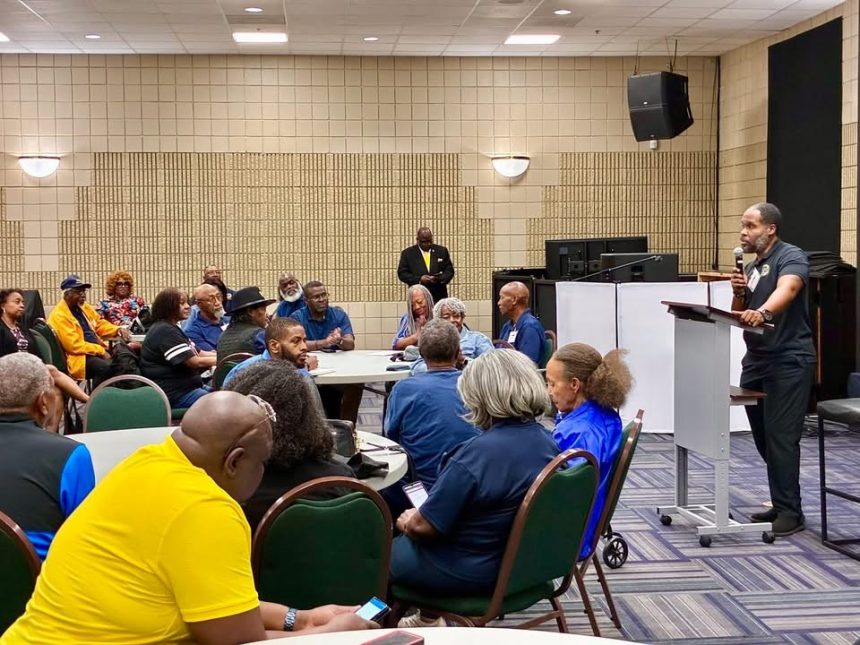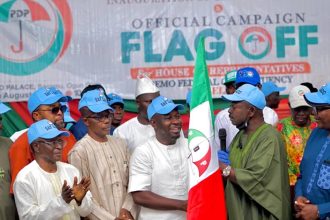The recently announced shuttering of the New Georgia Project — which has mobilized hundreds of thousands of voters across the state since former gubernatorial candidate Stacey Abrams founded the group in 2013 — was disappointing, but not surprising to Black Voters Matter co-founder Cliff Albright.
“We’ve known for some time that they’ve been headed in that direction,” Albright told Capital B Atlanta of NGP on Monday. “It’s a loss, but it’s one that I think the rest of the organizations here are capable of filling.”
Leaders of the New Georgia Project were accused of extensive financial mismanagement and corruption years prior to the organization’s announced shut down last week. Years of door knocking, phone banking, mobilization and organizing by Abrams, her peers, and her successors have been credited with turning Georgia blue in 2020 for the first time since 1992, and sending two Democrats to the U.S. Senate for the first time in decades.
Abrams left the organization to run for governor in 2017, years prior to its downfall. In January, the State Ethics Commission issued a $300,000 fine against the New Georgia Project over its 2018 campaign spending in support of Abrams and other Democrats running for office.
Abrams could not be reached for comment.
Much of the New Georgia Project’s Black voter engagement work, advocates fear, has been undone by Republican officials looking to help their party maintain power, both in the Georgia General Assembly and the White House.
In response to historic Black turnout during the 2020 election cycle, Republicans in the Gold Dome enacted SB 202, which made it illegal to give water to voters within 150 feet of a polling place, and SB 189, which made it easier for conservative activist groups to issue mass voter eligibility challenges in Georgia.
In the past, New Georgia Project has taken credit for registering 500,000 voters in Georgia. The secretary of state’s controversial voter list maintenance work has led to an estimated 478,000 inactive voters being removed from the state’s voter registration rolls earlier this year. A study conducted by Fair Fight found that Black people were overrepresented among those on the cancellation list once people who have voted in other states were removed from the overall count.
The U.S. Supreme Court is reviewing a case that advocates also fear could eliminate a key provision of the 1965 Voting Rights Act regarding allowing minority voters to elect their preferred candidates.
New Georgia Project canvassers Kayla McCall (left) and Mardie Hill go door-to-door to inform residents about the upcoming primary election in May 2022, in East Point. (Elijah Nouvelage/AFP via Getty Images)
The work continues
Albright and other leaders of some of Georgia’s most prominent voter-engagement groups say they’re prepared to continue the work they’ve been doing alongside the New Georgia Project. While they say Black voter fatigue remains a challenge in the wake of lower turnout figures in 2024, the negative impact President Donald Trump’s policies have had on Black people’s lives since taking office in January could motivate many to head to the polls during the 2026 midterm elections.
Since January, thousands of federal government workers have been laid off, furloughed, or forced to work without pay during an ongoing government shutdown. Even more are expected to be impacted by funding cuts to social safety net programs, such as Medicaid, the Supplemental Nutrition Assistance Program, and Housing and Urban Development rental assistance.
The rollback of diversity, equity, and inclusion programs nationally has been partially blamed for a combined total of at least 319,000 Black women losing their jobs between February and July, according to one prominent gender economist.
Albright said the impact the government has had on Black people under Trump this year is motivating many to head to the polls.
“If you’re somebody who was skeptical about whether whose president matters, I think that the answer to that is clear,” Albright said. “We even hear people that will say, ‘You know what? I really didn’t think that [voting] matters. I didn’t really think that there was a difference and I was wrong. I’ma vote this time, or I’ma vote differently this time.’”
Helen Butler, executive director of the Georgia Coalition for the Peoples’ Agenda, said the number of Black people her group has registered to vote this year is “on par” with other non-presidential election cycles.
“We’re back to where we normally would be,” Butler told Capital B Atlanta on Monday. “People are beginning to turn out for the local municipal races. … I think we’ll see an increase in turnout.”
Black voter engagement is “stronger than it’s ever been,” according to Georgia NAACP President Gerald Griggs, who said it’s misleading to compare 2024 turnout to the levels it reached in 2020 during the pandemic, which boosted mail-in voting.
He pointed out overall turnout reached record levels in 2024, when 68.3% of eligible voters in Georgia participated in the presidential election, exceeding the national average of about 65%.
“In 2020 it was about 5 million voters,” Griggs said. “A large percentage of that was African-American voters. We’re still voting at [about] the same level.”
Multiple gubernatorial candidates recently spoke at the Georgia NAACP’s state conference earlier this month. Griggs said the national NAACP has earmarked $1 million in 2026 midterm election cycle spending on voter mobilization in Georgia.
“That’s twice as much as they invested in 2024 and 2020,” he said. “As much as we hate to see New Georgia Project go, as the oldest civil rights organization and the one responsible for voter engagement and voter turnout for over 100 years, nothing’s changed.”
Read More:
The post Voter Engagement Groups Stepping Up as New Georgia Project Shuts Down appeared first on Capital B News – Atlanta.









